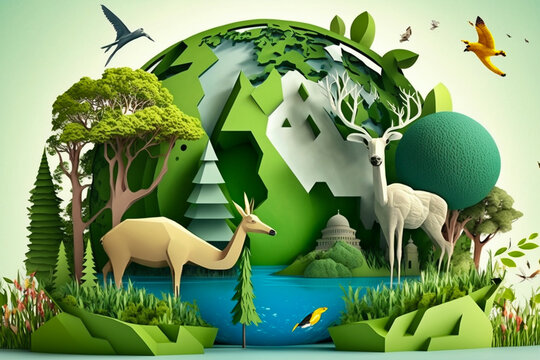
B.Sc Ecology Admission, Eligibility, Fee, College, Syllabus
- Science
Notification:

Table of Contents
B.Sc. (Ecology) is an undergraduate program that studies ecosystems. It is an interesting subject for nature lovers and conservation enthusiasts. It focuses on the study of broad areas such as,
With global concerns over climate change and loss of biodiversity, this is the most crucial time to train ecologists. Ecologists carry out scientific research while studying this subject. There is growing interest in B.Sc. Ecology due to the shift toward sustainable and greener initiatives.
Few of the highlights of this course are given below:
| Course Level | Graduate |
| Full-Form | Bachelor of Science in Ecology |
| Duration | 3 years |
| Examination Type | Semester System |
| Eligibility | 10+2 qualification (Major science subjects such as Biology, Math and Chemistry) |
| Admission Process | Merit-based and Entrance exam-based |
| Course Fee | INR 20,000 to INR 60,000 |
| Average Salary | INR 1,50,000 to 3,50,000 (annually) |
| Top Recruiting Companies | L&T, Accenture, Maxwell Ecosystems, JayPee, Allstate solutions, Grassroots research, Westrock, Roufs Cleaning, Intertek, etc. |
| Job Positions | Wildlife Film-maker and Photographer, Environment Photographer, Environment Journalist, Conservation Hydrologist, Forest Carbon Specialist, Director of Waste Management, Senior Programme Officer |
The B.Sc. in Ecology program provides intensive knowledge in ecological processes. It gives a closer look at biodiversity conservation and environmental management. This balance of theoretical knowledge and practical training enables a clear understanding of living organisms and their surroundings. The study includes wide area discussions over,
Students become experts in facing environmental issues and understand sustainable development. It stimulates the interdisciplinary application of the principles of biology, chemistry, physics, and environmental science. It promotes the complete understanding of complex ecological systems.
The eligibility for a B.Sc. Ecology application is as follows:
The B.Sc. program in ecology takes three years comprising six semesters. Every semester in the college consists of mandatory courses, optional courses, skills and practice sessions as well as practical exercises and field trips. The course pattern is formulated in such a way that the students can have an overall understanding of ecology with good theoretical knowledge and adequate practical experience.
Immediately following graduation, students have promising career opportunities, which include:
| Top Colleges | Fee |
|---|---|
| University of Delhi | ₹10,000-₹15,000 |
| Assam University (Silchar) | - |
| Banaras Hindu University BHU | ₹8,000-₹12,000 |
| Indian Institute of Science(Karnataka) | - |
| Amity University | ₹80,000-₹1,50,000 |
| Christ University (Bangalore) | ₹60,000-₹1,20,000 |
| Fergusson College (Pune) | ₹30,000-₹50,000 |
| Presidency College (Chennai) | - |
| St. Xavier's College (Mumbai) | - |
| Madras Christian College | - |
The cost of a B.Sc. Ecology depends upon the institution the student chooses. Below is a general estimate of the fees in some of the top colleges per year basis.
| Semester 1 | Semester 2 |
|---|---|
| English | English II |
| Introduction to Environmental Sciences | Ecosystem Dynamics |
| Basics of Biostatistics | Principle of Biochemistry |
| Principle of Biochemistry | Practical |
| Practical | - |
| Semester 3 | Semester 4 |
| English III | English IV |
| Components of Biodiversity & Conservation | Environmental Microbiology |
| Natural Resources | Fundamentals of Nanotechnology |
| Fundamentals of Bioinformatics | Bioinformatics & Nanotechnology |
| Basics of Computers | Tissue Culture |
| Semester 5 | Semester 6 |
| Environmental Chemistry | Environmental Management |
| Environmental Pollution | Eco-restoration and Development |
| Environmental Monitoring and Techniques | Solid Waste Management |
| Advance Instrumentation Techniques | Ecotourism |
Upon completion of a B.Sc. in Ecology, students can opt for higher studies to specialise further in their area of interest.
Graduates of B.Sc. Ecology can look for jobs both in governmental sectors as well as in private sectors. The potential sectors where they can involve themselves are:
Salary prospects for the graduate of the B.Sc. Ecology programs range depending on experience, location, and nature of the organisation. Salaries start from an average of ₹2.5 lakhs to ₹5 lakhs per year for some at starting positions. Experienced professionals can get salaries in the range of ₹7 lakhs to ₹12 lakhs in a year. Whereas, postgraduate degrees with experience can fetch a higher range of salary.
| Name of Job Profile | Average Annual Salary in INR |
|---|---|
| Environmental Specialist | 4,91,752 |
| Environmental Consultant | 4,43,732 |
| Research Assistant | 3,02,473 |
| Wildlife Film-maker | 1,268,000 |
| Environment Journalists | 3,46,511 |
| Conservation Hydrologist | 2,93,084 |
| Environment Photographer | 3,45,727 |
| Director of Waste Management | 2,123,000 |
B.Sc. Ecology is a relevant and exciting course with considerable opportunities for the future in conservation, research, and environment management. At a time when sustainable thinking and climate action are becoming rapidly popular across the world, ecologists hold the key to a greener future. So, future students in this course would play a highly significant role in conserving ecosystems and furthering sustainable living practices in all fields.
How likely are you to recommend Medicaljagat.com to a friend or a colleague?